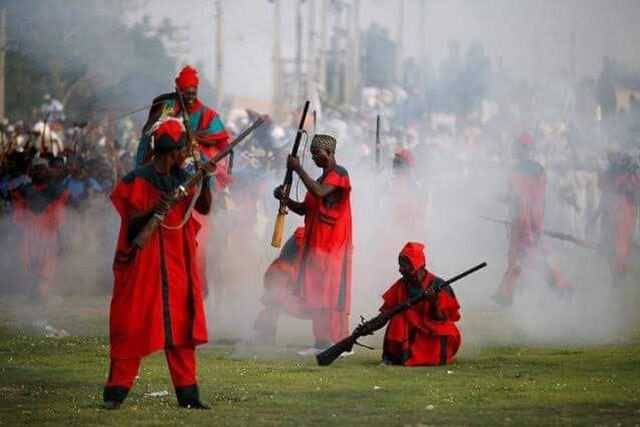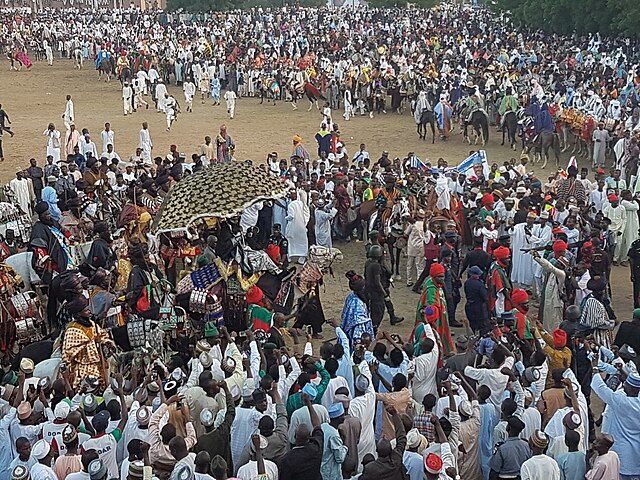Kano, the most populous city in Northern Nigeria, has been embroiled in controversy after the police prohibited its renowned Durbar festival due to a dispute between two traditional royals. The decision has sparked outrage among the city’s inhabitants.
In the late hours of Thursday, the police in Kano declared the suspension of the vibrant annual horse procession led by the traditional emir and his courtiers, which marks the Muslim Eid celebrations of sacrifice.
Tensions have been high in Kano since the disagreement erupted between the two rival emirs, both claiming the right to the traditional throne in the city. The incumbent was dismissed by the state assembly, and his predecessor was reinstated by the state governor, resulting in a legal battle between the two emirs.
The ban caught Kano residents by surprise, just days before Eid in a city that serves as the de facto capital of Nigeria’s predominantly Muslim north. Resident Anas Ahmad expressed his frustration, stating, “This is outrageous, how do we celebrate the Eid without the Durbar.” The 32-year-old butcher added, “Without the Durbar, the Eid will be like tea without sugar because Durbar is what makes the Eid glamorous and exciting.”
Although emirs and other traditional rulers hold no constitutional power in Nigeria, they wield significant religious and social influence. Nigerians are already facing challenging times following government reforms a year ago that have led to soaring petrol and food prices and the naira currency plummeting against the dollar.
As Kano residents prepare for Eid, many were already upset that they could not afford to buy a ram for their religious sacrifice due to the high cost of food. Usman Ahmad, a 48-year-old resident, remarked, “People cannot buy a ram for the feast because they have no money and now the Durbar that entertains them has been cancelled, how do we then celebrate the Eid?” He added, “This is sad and unfortunate. I can’t imagine Eid without meat and Durbar.”
The police, in a statement, announced that all Durbar activities had been banned, citing security concerns. This marks only the second time in a decade that the traditional horse carnival has been suspended. In 2015, the Durbar was cancelled over security fears following a Boko Haram militant attack on the central mosque outside the emir’s palace in November 2014, which claimed the lives of around 200 worshippers.

Since last month, an uneasy calm has settled on the city after Abba Kabir Yusuf, the state governor, restored former emir Muhammadu Sanusi II to the throne four years after his deposition. His predecessor, Aminu Ado Bayero, was removed alongside four other emirs after Kano lawmakers amended the 2019 emirate law that established them.
Bayero challenged his removal in a federal high court in the city and insists he remains the emir, while Sanusi obtained an order from a state high court to counter Bayero. While Sanusi resides in the emir’s palace, where he holds daily court, Bayero is lodged in a royal guest house a few kilometres away, where he receives his supporters. Both palaces are heavily guarded by military and police personnel.
The Durbar attracts people from all over Nigeria as well as Western tourists. They gather outside the palace a day after Eid for a colourful procession of horses. Royals and courtiers display equestrian skills as part of their homage to the emir, who acknowledges their greetings seated on horseback. For three days, the emir tours the city on horseback in a huge procession, with residents lining the streets.
Hannatu Shamsu, a 43-year-old mother of three who returned to her native Kano from the capital Abuja on Thursday for the Durbar, expressed her disappointment, saying, “It is most unfair.” She added, “I came yesterday with anticipation for the Durbar, which my children have been eager to attend, but hours after, the ban was announced. I’m really angry.”
Resident Hashimu Kabir, while expressing his “shock and annoyance,” blamed the two royals for the “disastrous ban”. The 56-year-old textile trader stated, “There can’t be two emirs in Kano.” He further added, “I don’t blame the police for the ban since each of the two royals is claiming right to the throne.”
The ban on the Durbar festival has undoubtedly dampened the spirits of Kano residents, who were eagerly anticipating the celebration amidst the challenging times they face. The ongoing dispute between the two emirs has further complicated the situation, leaving the city in a state of uncertainty and disappointment.


